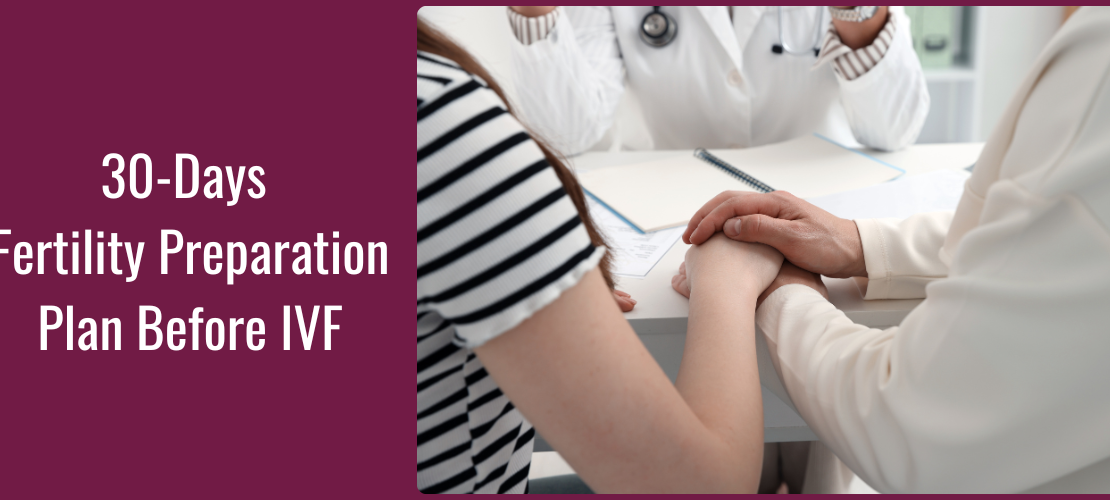- November 26, 2025
- Posted by: admin
- Categories: IVF, IVF treatment

Preparing for IVF is one of the most exciting and emotional phases in your parenthood journey. While advanced medical technology plays a strong role in success, your body, mind, and lifestyle also have a major impact on how smoothly the process goes.
The good news? You can start preparing right now—and even small daily habits can strengthen your fertility, balance your hormones, improve egg and sperm quality, and create a healthy environment for conception.
This friendly, easy-to-follow 30-day fertility preparation plan is designed to guide you through diet, lifestyle, emotional wellness, and medical readiness, helping your body feel at its best before starting IVF.
Why Preparation Before IVF Matters
Many couples don’t realize that egg and sperm quality—along with uterine health—can be improved naturally by making the right lifestyle changes. Doctors recommend preparing at least 30 days (ideally 2–3 months) before IVF to help:
- Improve blood flow to ovaries and uterus
- Support better egg development
- Improve sperm count, motility, and morphology
- Reduce inflammation in the body
- Balance hormones
- Maintain a healthier body weight
- Reduce stress, which affects fertility
- Improve response to IVF medications
A well-planned approach can make your IVF cycle smoother and improve the overall fertility health of both partners.
30-Day Fertility Preparation Plan Before IVF
This plan is divided into four weekly phases, each focusing on improving your fertility naturally.
Week 1: Cleanse, Reset & Build Healthy Foundations (Days 1–7)
The first week is all about removing harmful habits and creating a fresh start for your body.
-
Switch to a Clean Fertility-Friendly Diet
Remove foods that can interfere with hormones, egg quality, and overall reproductive health:
Avoid:
- Sugar
- Junk and processed foods
- Excess caffeine
- Alcohol
- Smoking
- Deep-fried foods
- Artificial sweeteners
Include more of:
- Fresh fruits (berries, oranges, pomegranates)
- Green vegetables (spinach, kale, broccoli)
- Whole grains
- Healthy fats (avocado, nuts, seeds, olive oil)
- Plant proteins (lentils, beans)
- Lean proteins (eggs, chicken, fish)
Your goal this week is nutrient balance and reducing inflammation.
-
Hydration Boost
Drink 2–3 liters of water daily to improve blood flow and detoxify the body.
-
Start Gentle Stress-Relief Activities
Try:
- Deep breathing
- Light yoga
- Evening walks
- 5 minutes of meditation
Stress affects the hormones responsible for ovulation and sperm production. Week 1 sets your mind in a calmer direction.
-
Regular Sleep Routine
Aim for:
- 7–8 hours of sleep
- Fixed sleeping and waking times
This balances hormones like melatonin and cortisol.
Week 2: Boosting Egg, Sperm & Hormonal Health (Days 8–14)
This week focuses on fertility-enhancing nutrients and building a strong reproductive foundation.
-
Start Fertility Supplements (If Doctor Approved)
Commonly recommended IVF pre-cycle supplements include:
- Folic acid
- Vitamin D
- CoQ10 (improves egg quality)
- Omega-3 fatty acids
- Iron
- Zinc
- Vitamin B12
For men:
- L-carnitine
- Selenium
- CoQ10
Always take supplements under medical guidance.
-
Add More Fertility Superfoods
Try to include these daily:
- Walnuts & almonds
- Flax seeds & chia seeds
- Pomegranate juice
- Green leafy vegetables
- Salmon
- Paneer/tofu
- Eggs
- Whole grains like quinoa
These foods are rich in antioxidants, essential fats, and minerals that support egg and sperm quality.
-
Improve Blood Flow to the Reproductive Organs
Helpful activities:
- Moderate walking
- Cycling
- Fertility yoga
- Prenatal massage
- Warm baths
Better blood flow = better nutrient supply to the ovaries and uterus.
-
Reduce Screen Time & Digital Stress
Limit mobile/laptop use before bedtime. Blue light affects sleep and hormones.
Week 3: Strengthen Mind–Body Connection (Days 15–21)
IVF can be emotionally challenging. Week 3 focuses on mental strength and emotional wellbeing.
-
Practice IVF-Focused Meditation
Spend 10 minutes daily on:
- Relaxation
- Positive affirmations
- Deep breathing
- Mindfulness
Stress reduction can improve hormonal balance and increase IVF treatment comfort.
-
Exercise, But Not Too Much
Light-to-moderate physical activities are perfect:
- Brisk walking
- Slow jogging
- Yoga
- Pilates
Avoid:
High-intensity workouts
Weightlifting
Long-distance running
Extreme exercise reduces ovulation hormones.
-
Create a Fertility Meal Pattern
Eat at the same time every day.
Try:
- A protein-rich breakfast
- Light but balanced lunch
- Early dinner (by 8 pm)
- Healthy snacks like fruits, nuts, seeds
Stable meal timing helps balance insulin and hormones.
-
Reduce Salt & Sugar
Helps prevent bloating, inflammation, and blood pressure fluctuations during IVF injections.
Week 4: IVF-Ready Body & Mind (Days 22–30)
This week prepares you physically, emotionally, and medically for starting IVF.
-
Complete Necessary Medical Tests
Your IVF specialist may recommend:
- AMH test
- Hormone profile
- Ultrasound
- Semen analysis (for men)
- Thyroid & vitamin D tests
- Infectious disease screening
Completing these helps doctors plan the ideal IVF protocol.
-
Discuss Treatment Plan & Medications
Learn about:
- Ovarian stimulation injections
- Possible side effects
- Expected appointment dates
- Do’s and don’ts during stimulation
- Lifestyle restrictions
This reduces anxiety and prepares you mentally.
-
Eat IVF-Supportive Meals
Include foods that promote:
- Healthy uterine lining
- Stable hormones
- Better digestion
Add:
- Beetroots
- Pumpkin seeds
- Spinach
- Warm meals
- Herbal teas
- Turmeric milk
Avoid:
Fast food
Cold drinks
Refined carbs
-
Maintain Calm and Positivity
You are entering an important phase. Spend time on:
- Reading
- Mindfulness
- Listening to relaxing music
- Light stretching
- Talking with your partner
Emotional balance helps your body respond better to IVF medications.
Tips for Both Partners Before IVF
IVF is a team effort. Both partners should follow these practices:
For Women
- Maintain a healthy weight
- Reduce caffeine (max 1 cup/day)
- Avoid chemical exposure
- Practice fertility yoga
- Focus on iron-rich food
For Men
- Avoid hot baths and tight underwear
- Quit smoking, alcohol, and recreational drugs
- Take zinc, selenium, and CoQ10 (doctor advised)
- Eat protein-rich foods
- Reduce stress and get 7–8 hours of sleep
Healthy sperm boosts IVF success and embryo quality.
Final Thoughts
Preparing your body for IVF is not only about physical health—it’s also about emotional stability, positive habits, and a supportive lifestyle. This 30-day fertility plan helps you enter your IVF cycle feeling confident, strong, and ready.
By focusing on nutrition, exercise, stress reduction, sleep, and medical readiness, you give your body the best chance to respond well to treatment.
Remember: Every small step counts. Be kind to yourself, stay consistent, and trust your journey.

